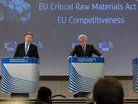RAWMINA Tackles EU's Rare Earth Minerals Shortfall

The European Union is grappling with major challenges in meeting its objectives for critical raw materials (CRMs), essential components for the continent's clean energy transition and tech-driven future.
These materials, crucial for manufacturing batteries, electronic devices, and renewable energy infrastructure, are at the heart of the EU's efforts to reduce dependence on external markets and foster a more sustainable, circular economy.
In response to these challenges, the RAWMINA project was initiated in 2021. This €9 million Horizon-Europe funded initiative brings together 19 specialist partners from 10 countries across the EU, UK, and South America. The project aims to develop innovative, sustainable processes for extracting CRMs from existing mine waste resources.
Diego Morillo Martín is Project Coordinator from LEITAT, a technology centre that develops and transfers technologies to businesses.
He explains the project's significance: "RAWMINA has successfully demonstrated the feasibility of a continuous and industrially scalable system that combines multiple innovative technologies for efficient and sustainable metal recovery from mine waste.
“This sets a new standard for the mining industry and underscores the potential for circular economy practices."
As RAWMINA enters its final phase, the project is set to culminate in a conference in Barcelona. Co-organised by LEITAT and the Autonomous University of Barcelona, the event will showcase the project's achievements and foster dialogue on the future of CRM recovery.
Critical Raw Materials Act: Ambitious targets, tough realities
While projects like RAWMINA demonstrate innovative approaches to CRM recovery, the EU faces significant hurdles in meeting the targets set out in its Critical Raw Materials Act (CRMA).
The Act, which came into force in May 2024, establishes ambitious goals for domestic production of critical minerals by 2030: 10% of annual needs mined, 25% recycled, and 40% processed within the EU.
However, production forecasts suggest that most of these targets may be out of reach. This shortfall could have far-reaching implications for the EU's zero carbon goals and its efforts to reduce dependence on China, which currently accounts for 98% of EU rare earth permanent-magnet imports.
Johanna Bernsel, a European Commission spokesperson, acknowledges the challenges but emphasises the EU's commitment: "We will do our best to promote projects that help meet the goals in the CRMA. Projects in Europe will benefit from a streamlined permitting process, as well as coordinated support for accessing de-risking financing tools and matchmaking with downstream users."
Mining industry response and future outlook
The introduction of the CRMA has already sparked increased investment in mining and processing projects within the EU. Member states are reviewing their regulatory frameworks to facilitate domestic extraction, while companies explore opportunities to establish processing facilities. The legislation has also spurred research into substitution technologies and recycling methods.
Despite these efforts, the road ahead remains challenging. EU demand for rare earth minerals is forecast to increase six-fold by 2030 and sevenfold by 2050, underscoring the urgency of developing robust, sustainable supply chains.
As the EU continues to navigate these complex issues, projects like RAWMINA offer a glimpse of potential solutions.
Diego Morillo Martín concludes: "By fostering dialogue with stakeholders and the public, we aim to build trust and support for sustainable mining practices and encourage cooperation and market development."

